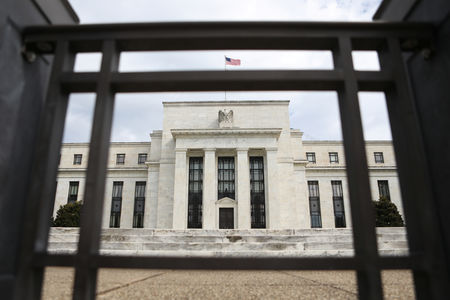Bond buying on bets for Fed cutting cycle ‘misplaced,’ MRB Partners says

Invesitng.com — Investors continued to buy on bets for a meaningful Fed rate-cutting cycle, but these hopes remain “misplaced,” as inflation remains sticky, investment research firm MRB Partners said in a Friday note
“Bond investors remain biased to betting on lower yields, in the mistaken belief that a meaningful rate-cutting cycle is approaching,” MRB Partners said in a Friday note. “We continue to disagree with this view and are underweight bonds.”
The bullish bets on bonds, which pressured yields, were juiced by this week’s U.S. CPI report, which was close to the consensus following surprises to the upside in the past three months.
The data helped ease worries about the prospect of a rate hike and fueled expectations that the road higher for Treasury yields is narrowing.
As was the case with “April’s employment report, these data should provide reassurance to Chair Powell that current guidance that the next move is likely to be a cut remains appropriate,” Macquarie said in a recent note.
But a deeper dive into the data suggest it was still not encouraging for the Fed, and its 2% target remains a long way off, MRB Partners said, pointing to a super core measure of inflation that zones in on core services ex-housing.
Over the last six months, the super-core CPI rate has been north of 6% on an annualized basis.
The pressures on inflation from sticky super core inflation are likely to persist until an “economic downturn kills labor’s bargaining power and companies’ ability to lift prices,” according to MRB Partners.
Despite the softer inflation print, the chorus from Fed members this week following the data appeared to be one of caution.
Speaking after the April CPI release, New York Fed President John Williams suggested there was no evidence yet in his mind pressing for a rate cut.
“I don’t see any indicators now telling me…there’s a reason to change the stance of monetary policy now,” Williams said.
Against the backdrop of sticky inflation, those in the disinflation camp, or so-called disinflationists, would be quick to point out that over the past year inflation has slowed considerably, but those gains are related to pandemic distortions.
“The deceleration in measured CPI over the past 12-15 months was encouraging, but has been mostly related to an unwinding of pandemic and re-opening price distortions,” MRB Partners argues, noting that evidence is still needed to show that monetary policy is tight enough to bring about durable disinflation.
The bond buying bias has been driven by bets that yields “have little upside from here and are expected to return to much lower ‘normal’ levels
in due course,” MRB added, though cautioned that this view is “anchored in hope not reality. “
Still, acknowledging that the bond buying momentum is likely continue, MRB Partners said it expects the risk assets including equities to continue to rack up gains.
“The environment is back to ‘more of the same’, risk-on for as long as
government bond markets stay calm,” MRB Parters said, though reiterated its stance that rate cut expectations cold unwind after the current pause, putting hike up for discussion on the Fed table in the not too distant future.
“Further down the road, U.S. rate expectations could even flip to pricing in higher rates,” it added.
While a rate hike has been played down by Fed chairman Jerome Powell, others Fed members aren’t so sure about ruling out the need to hike should disinflation stall.
“While the current stance of monetary policy appears to be at a restrictive level, I remain willing to raise the target range for the federal funds rate at a future meeting should the incoming data indicate that progress on inflation has stalled or reversed,” Fed Governor Michelle W. Bowman said Friday.



